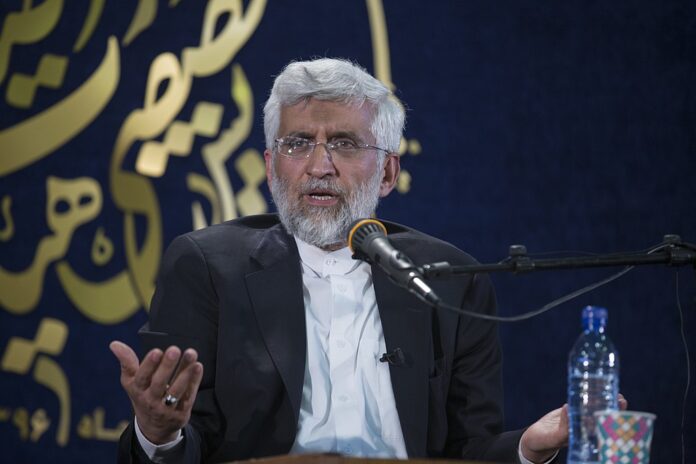Former nuclear negotiator Saeed Jalili holds a slight advantage in early results from Iran’s presidential election, prompting expectations of a runoff next week
Iran’s presidential election has taken a dramatic turn with hardline candidate Saeed Jalili emerging with nearly 42% of the vote after more than 8 million ballots were counted. Jalili, a former nuclear negotiator, surged ahead, surpassing earlier front-runner Massoud Pezeshkian, who now trails slightly with just over 40% of the vote.
The unexpected shift in fortunes suggests a closely contested election that may necessitate a runoff, scheduled for next Friday, if no candidate secures more than 50% of the total vote in this round.
Embed from Getty ImagesThe electoral process has not been without incident. In Sistan-Baluchestan province, two security force members were tragically killed when unidentified gunmen attacked a vehicle transporting election boxes, underscoring the tensions surrounding the election.
The death of former President Ebrahim Raisi in a helicopter crash on May 19 necessitated this election to select his successor. Raisi’s tenure was marked by strict enforcement of conservative policies, including through the morality police, who impose stringent dress codes on women.
Massoud Pezeshkian, a reformist candidate and former health minister, has pledged a different approach, criticizing the morality police’s actions as “immoral” and advocating for greater personal freedoms.
Despite having 61.5 million eligible voters, Iran faces a challenge with low voter turnout, echoing previous electoral trends seen in recent parliamentary and presidential elections. Supreme Leader Ayatollah Ali Khamenei has urged Iranians to turn out in maximum numbers, highlighting the significance of this election for the country’s future direction.
The election comes against a backdrop of lingering social unrest, exemplified by widespread protests in 2022 following the death of Mahsa Amini, a young woman detained by the morality police for violating dress codes. Human rights organizations have condemned the ensuing crackdown, alleging hundreds of deaths and thousands of detentions.
Analysis:
Political Perspective: Saeed Jalili’s surge in the election results marks a resurgence of hardline politics in Iran. As a former nuclear negotiator known for his staunch conservatism, Jalili’s potential victory signals continuity with the policies of the late President Ebrahim Raisi, who upheld strict conservative values during his tenure. This trajectory suggests a potential reinforcement of Iran’s confrontational stance on international issues, particularly concerning nuclear policies and regional geopolitics.
On the other hand, Massoud Pezeshkian’s campaign represents a moderate reformist approach, advocating for social liberties and criticizing the moral policing enforced by authorities. His platform resonates with segments of the population seeking greater personal freedoms and a more liberal approach to governance. The electoral competition between Jalili and Pezeshkian underscores the divergent paths Iran could take, influencing domestic policies and international relations significantly.
Social Implications: The election outcomes are closely tied to social dynamics within Iranian society, particularly regarding individual freedoms and the enforcement of moral codes. Pezeshkian’s critique of the morality police resonates with young Iranians and urban populations advocating for more relaxed social norms. Conversely, Jalili’s potential victory may bolster conservative elements seeking to maintain traditional values and stringent societal controls. The election thus serves as a barometer of societal attitudes towards personal freedoms and government intervention in private life.
Human Rights Concerns: Iran’s human rights record remains under scrutiny, exacerbated by past crackdowns on dissent and civil liberties. The election occurs amidst international monitoring, with concerns over electoral fairness and the treatment of political activists. The outcome will influence Iran’s approach to domestic reforms and its international reputation, particularly regarding human rights abuses. The election’s aftermath may either deepen international isolation or present opportunities for dialogue and reform, depending on the incoming administration’s policies.
Potential Economic Implications: While the immediate electoral discourse focuses largely on political and social issues, the election outcome could indirectly impact Iran’s economy. Economic policies, including sanctions management and foreign investment strategies, may diverge based on the winning candidate’s approach to international relations and domestic reforms. A stable political transition under Jalili or Pezeshkian could bolster investor confidence or conversely contribute to economic uncertainty, depending on policy directions articulated post-election.
